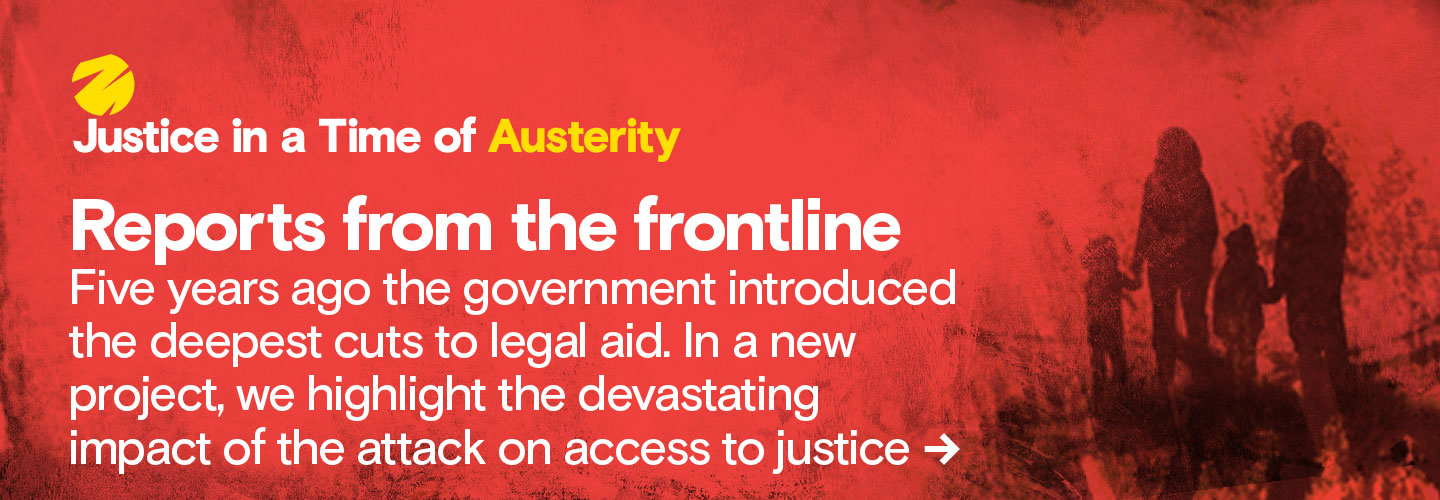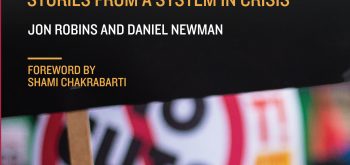There are already 15 people at the foodbank at St Matthew’s Church, just off the busy Wandsworth Bridge Road, South Fulham by the time we arrive shortly after doors open. Volunteer Sue is on hand to make sure everyone receives a cheery welcome and a hot cuppa as they wait to pick up their emergency food parcels. She’s on first name terms with the regulars and fusses over the young mums. ‘Does baby want milk? I can warm some up. I’ll get some toast,’ she says.
I’m shadowing Sophie Earnshaw, a lawyer from Hammersmith and Fulham Law Centre as part of the Justice in a time of Austerity project, who is on hand to offer legal advice to those who need it. And, judging by today’s experience, most do.
An hour into the session we meet Asma. Dressed in a bright blue hijab, the 33 year old woman from Algeria could still be in her teens. She has three children under the age of 16.
Asma is clearly at the end of her tether. ‘I haven’t received any money for three months. I’m living off food vouchers,’ she tells us. Earlier this year, her husband threatened to kill her, not for the first time. The school was informed and social services arranged for her and the kids to move to a refuge.
The family, who moved to London in 2016, ended up in the middle of nowhere, outside Lincoln. ‘It was a very rural area. Nothing there, just grass,’ she recalls. Six days later, they were back in London and, for the last two months, they have been living in another refuge.
She hasn’t a penny to live on: the housing benefit is paid directly to the refuge; her husband receives the child benefit and, the final straw, she has now been refused universal credit.
Last December Britain’s largest foodbank provider the Trussell Trust provided 159,388 three-day emergency food supplies, a 49% increase on the monthly average. This year will be their busiest to date and they blame that on benefit cuts and the chaos of universal credit.
The Department for Work and Pensions (DWP) has decided that Asma does not have a right to reside because she has split up with her partner who is an EEA national. Sophie Earnshaw advises that on the facts before her, the DWP is in error and has failed to take into account that Asma is still a family member of an EEA national and does indeed have a right to reside. ‘Even if you and your husband are not together, you should still be entitled to universal credit,’ she explains.
Asma has requested a review of the decision. The problem for Asma is that it will take months for a statutory appeal and her situation is self-evidently urgent. Earnshaw advises that one course of action would be to send a pre-action letter threatening to challenge the refusal in the courts as well as the local authority for its failure to provide financial support. Both public law challenges.
‘I need a solicitor,’ Asma says. Sophie Earnshaw explains that she is a solicitor and that she works at Hammersmith and Fulham Law Centre. ‘I looked everywhere but I couldn’t find a solicitor,’ the woman continues. ‘I called the law centres. They told me they didn’t have appointments until January. I don’t have anywhere to go with the children.’ The lawyer takes her number and assures Asma that she will fix an appointment at her office.
*
Later I recount our meeting with Asma to Daphine Aikens, who founded the Hammersmith and Fulham Foodbank back in 2010. ‘I’m not shocked. I’m still horrified though,’ she tells me. Hammersmith and Fulham was one of the first food banks in London and now opens six times a week in three different locations.
St Matthew’s provides a smart and airy setting for a foodbank. At first glance, you might not know it was a church hall. The chairs for the pews have been stacked to one side and the lectern and wonky Christmas tree are obscured by a wall of folded up seats.
As you walk into the hall, there are a series of large white plastic tubs full of fresh fruit and veg including bananas, melons and pineapples – if you have a voucher, you can help yourself. A third of the hall is screened off and, out of sight, volunteers put together the parcels. The rest of the hall is arranged like a café and recipients of food vouchers can sit at a table and have their tea provided by Sue. ‘Whilst you are waiting, volunteers are packing a three day supply of food just for you,’ reads the note on each table. Each package allows for 10 meals per family member. In the six months up to the end of November, Hammersmith and Fulham Foodbank fed 7,342 people compared to 6,376 last year and 3,317 the previous year.
‘We originally started just offering food parcels, as well as a listening ear and a bit of sign-posting,’ Aikens explains. But she soon realized that ‘it wasn’t a question of people coming in once or twice, picking up a food parcel and – suddenly – everything’s fine’. ‘We started to notice that people started to need the food bank more regularly,’ Aikens says. ‘By the time people come to a foodbank they aren’t just hungry there is usually something else going on.’
The foodbank runs holiday clubs for families with children who would get free school means, cooking and budgeting courses and last week it started a mental health project offering up to 20 clients up to six free sessions with a psychotherapist. Of the seven people we see, I reckon that at least three appear to have obvious and long term mental health issues. ‘About 50% of food bank clients, not just in Hammersmith and Fulham but across the country, do,’ adds Aikens.
The foodbank also provides debt and legal advice. It first developed a debt advice scheme with a local agency (Crosslight advice) until that run out of funding and then two advisers from Citizens Advice but now has just the one, who, Aikens notes, is ‘deeply stressed’. Hammersmith & Fulham Foodbank has been working with the law centre for three years but the drop-in clinic at this particular foodbank is relatively new. Sophie Earnshaw used to work at the Child Poverty Action Group before moving to the North Kensington Law Centre representing Grenfell survivors, bereaved family members as well as local residents. Her role as child poverty solicitor at Hammersmith & Fulham Law Centre is funded by the City Bridge Trust.
‘I don’t want it to be a place where people come every week. That was never the intention,’ Daphine Aikens says. She reckons that the dependence on the foodbank has grown since the introduction of universal credit. ‘We were one of the first boroughs to pilot it and it has been with us a couple of years,’ she says. ‘The impact has been very significant – life-changing in a very negative way.’
Sophie Earnshaw agrees. The problems with universal credit are manifold and the lawyer offers a ‘top five’: the minimum five week wait for first payment ‘that can put people instantly into arrears’; the disproportionate impact on disabled people who can end up receiving less under universal credit as noted this week by the Work and Pensions Committee (‘a huge issue’); and then there are the kind of ‘right to reside’ problems faced by the likes of Asma.
To this list, Earnshaw adds the possibility of up to 40% deductions for rent arrears and debt from someone’s allowance. ‘Where deductions are taken, people are now surviving on £35-£40 a week,’ she says. ‘How can anyone afford to live in London or anywhere else?’ Finally, the lawyer points to the general complexity of universal credit. ‘The DWP approach tends to be “computer says no” and close the claim. It is only if you have advice that you will know how to challenge that effectively.’

Pic: Jamie DC (Flickr)
Sophie Earnshaw meets one of her law centre clients, a Turkish lady in her 50s. They have arranged to meet at the foodback to go through her paperwork. Clearly in pain from major neck surgery, she has been incorrectly assessed by the DWP in relation to her personal independence payment (PIP) and failed to qualify for the mobility component.
There is no publicly-funded legal advice for welfare benefits as a result of the 2013 legal aid cuts under the Legal Aid, Sentencing and Punishment of Offenders (LASPO) Act. The only legal aid that remains is for appeals to the Upper Tribunal when there is only a flat fee of £208. Sophie Earnshaw calls that ‘a token gesture’. ‘You might well have spent 10 hours on a client before legal aid even kicks in,’ she says.
The lawyer will refer her Turkish client to a clinic that her law centre runs with a City law firm Debevoise & Plimpton. The firm’s lawyers, who volunteer at the law centre, will draft a submission in support of her appeal and attend the hearing at the first-tier tribunal. As Earnshaw explains the scheme, she mentions that she has spent £450 cash to a private solicitor. His advice turns out to be nothing more than filling out a form which, Earnshaw says, ‘takes no time at all. Frankly, it’s blatantly exploitative.’ As the client leaves, she struggles to lift herself from her seat and has to be helped on to her feet.
Earlier, we were interrupted, very politely, by a woman in her late 40s with a headscarf. She wanted to have a word with Sophie and to retrieve her cup of tea. It turns out we have inadvertently sat in her place.
The lady came to the UK from Afghanistan 12 years ago with her sister after she was the victim of an acid attack. She has severe burns down one side of her body and scarring all the way to her scalp. She is constant pain and continues to have ongoing surgery to try and make life bearable.
She attends the foodbank twice a week. Her Employment and Support Allowance (ESA) has been stopped after the DWP assessment, predictably, found her fit for work. Sarah from the CAB has referred the case on to Earnshaw for the appeal to the first-tier tribunal.
Earlier this month Labour promised to restore legal aid for benefit appeals. More than two-thirds of appeals against decisions on PIP and ESA are successful, according to the shadow justice minister Richard Burgon. He reckons that in the five years since the LASPO cuts came into effect in 2013, the number of people receiving legal aid to challenge benefit decisions has fallen by 99%; meanwhile the Ministry of Justice spends more than £100m a year on tribunals disputing appeals against benefit decisions.
*
Towards the end of the session, I speak again to Asma. She was 17 years old when she entered into an arranged marriage with her abusive and violent husband in Algeria.
She moved to France where her husband is from. She recounts how her kids were taken into care by social services after her husband attacked her son. What happened? He hit her son in the face with a bottle. ‘His face was covered in blood,’ she says. ‘I spent months trying to get them to return my children. I would have done anything to get them back.’
She told the judge ‘everything was OK’. ‘I didn’t want to lose my kids. I was crazy,’ she tells me. ‘I didn’t want to separate from him. I wanted him to change. I wanted to provide a good place with him for my family.’
The family later moved to the UK. The violence continued. After the husband threatened to kill their mother, the son told his teacher at school that he no longer felt safe living at home. That led to the intervention of UK social services. The family now share a refuge with other women and their children in a neighboring borough. She says her son is ‘worried all the time. He wants to know when we will have some money and when will we be secure.’
Asma is not receiving any financial support from her ex-partner. ‘I don’t know about the future,’ she says at one point. ‘I am very scared.’
This is Asma’s second trip to the foodbank. ‘Life isn’t just food,’ she says. ‘The children have so much they need and they see the other kids in the refuge with things.’ Before she leaves, she is given two Christmas present for the kids.
When I say it must be reassuring to have received some proper advice, she says: ‘Yes,’ before adding: ‘Do you think she will ring?’
Update: I spoke to Sophie Earnshaw yesterday. She met with Asma soon after the foodbank clinic. She has since challenged the local authority’s failure to provide financial support and weekly payments are now being made by social services and will continue until her universal credit is resolved. Names and some details have been changed to protect people’s identity.








